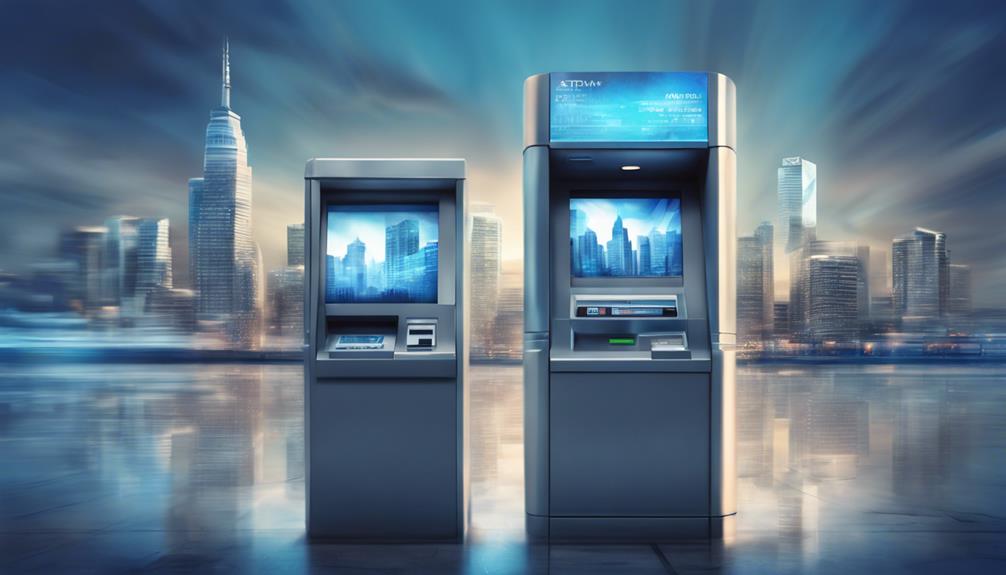Bitcoin Wallet

When you venture into the world of cryptocurrencies, a reliable Bitcoin wallet becomes an essential component of your digital journey.
By securely storing your private keys and Bitcoin addresses, this digital vault grants you controlled access to your digital assets.
But what makes a Bitcoin wallet tick, and how do you choose the right one for your unique needs?
As you explore the diverse range of wallets available, you'll need to consider factors such as security, convenience, and integration.
All of which will be crucial in safeguarding your digital wealth.
Characteristics of Bitcoin Wallets

Characteristics of Bitcoin Wallets
A Bitcoin wallet is fundamentally designed to securely store and manage your private keys and Bitcoin addresses, enabling you to engage in seamless transactions. This is the core function of any Bitcoin wallet, regardless of whether you use a software wallet, hardware wallet, or paper wallet.
The wallet acts as a bridge between your cryptocurrency and the blockchain network, allowing you to send, receive, and manage your assets.
To securely store Bitcoin, wallets can be divided into two main categories: hot wallets and cold wallets.
Hot wallets are always connected to the internet and are perfect for frequent transactions. They're vulnerable to online threats, so it's crucial to use strong passwords and two-factor authentication.
Cold wallets, on the other hand, are offline storage solutions that provide greater security for long-term storage. These types of wallets come in the form of hardware devices and are generally recommended for larger amounts of Bitcoin.
When choosing a wallet, it's essential to consider your needs. If you need to perform frequent transactions, a hot wallet might be best. For longer-term storage, a cold wallet is more secure.
Whatever your choice, it's crucial to understand the security measures and best practices to ensure the safety of your Bitcoin.
Choosing the Right Wallet Type
Choosing the right wallet type depends on your specific needs and preferences, as different wallets offer varying levels of complexity and features for managing your Bitcoin.
When deciding, consider the level of security you need.
For daily use, software wallets (e.g., Trezor, Electrum, Mycelium) are suitable due to their quick transactions and ease of use.
However, for maximum security, hardware wallets (e.g., Ledger Nano S) are ideal as they offer offline storage and protection from online threats.
The choice of device and operating system can be crucial. Popular options include wallets for Android, iOS, Linux, MacOS, and Windows, along with web wallets accessible via browsers.
As a user, you might require specific features.
New users may appreciate a user-friendly software wallet with a simple interface.
In contrast, experienced users might prefer advanced features such as multi-signature wallets and node compatibility.
Wallet compatibility with different address types like legacy and Bech32 is also important to consider.
Key Features for Security

When selecting a Bitcoin wallet, it's crucial to prioritize security features to protect your digital assets, as your wallet will store both your public and private keys.
Your private key is particularly vital, as it directly controls access and management of your cryptocurrency.
Among the key features to look for are:
Two-Factor Authentication (2FA): Adds an extra layer of security against unauthorized access by requiring a second form of identification after your password.
Hardware Wallets: Devices like Ledger and Trezor store your private keys offline, providing an additional layer of security against hacking and theft. These cold storage solutions are especially beneficial for those who've accumulated a significant amount of bitcoin.
Encryption Methods: Combining encryption methods from your wallet's public key to secure transactions ensures that transactions are both valid and secure.
Cold Storage: Offline wallets, also known as cold storage, provide the highest level of security for savings by storing a wallet in a secured place that isn't connected to the network.
Multi-Signature Wallets: These wallets require multiple independent approvals to spend a transaction, providing an additional layer of security against theft and unauthorized access.
As you manage your digital assets, these security features are essential to keeping your cryptocurrency safe.
Advanced Wallet Features
Beyond the fundamental security features, advanced Bitcoin wallets offer additional functionalities to enhance your overall experience and control over your digital assets.
These wallets take your security and flexibility to the next level by utilizing advanced technologies such as the Lightning Network, multi-signature wallets, and Bech32 address support.
Multi-signature wallets, like those provided by Coinbase and Binance, require multiple signatures to authorize transactions, adding an extra layer of security and control. This feature is particularly useful for businesses or individuals managing shared assets.
Additionally, these advanced wallets often support SegWit, which allows for more efficient transactions by increasing the number of transactions that can fit into a block.
Another feature is Bech32 address support, a newer address format that's more efficient and secure, reducing transaction fees and improving overall wallet performance.
Some advanced wallets even come equipped with full node capabilities, allowing you to validate transactions and blocks. This further increases the security and transparency of the Bitcoin network.
Lastly, advanced Bitcoin wallets often support second-layer solutions like the Lightning Network, enabling faster and cheaper transactions that occur off the main blockchain.
These features not only enhance security but also streamline your interactions with your digital assets by providing advanced functionality to manage and transfer your cryptocurrencies efficiently and securely.
Integration With Other Tools

Your Bitcoin wallet seamlessly integrates with various tools and platforms, enhancing your digital asset management experience.
For instance, you can easily manage your funds and send and receive Bitcoin transactions directly from your peer-to-peer marketplace, ensuring smooth and secure transactions.
Through its integration with different wallets and platforms, your Bitcoin wallet ensures you can make sure your funds are always accessible and easily transferable. This integration includes compatibility with platforms like Fidelity Digital Assets, Venly, and Dynamic, enabling seamless management of your digital assets.
Furthermore, the wallet integrates with your bank account, local payment methods, and card payments in over 130 countries, providing you with an extensive range of options to fund your wallet.
This extensive compatibility ensures that you can manage your cryptocurrencies without any restrictions and freely access the decentralized web.
Frequently Asked Questions
Which Is the Best Wallet for Bitcoin?
To make the best wallet choice for Bitcoin, consider your specific needs. For streamlined security, go with hardware wallets like Ledger Nano S Plus or Trezor One; for user-friendly ease, try Coinbase Wallet or Exodus; for advanced features such as multi-signature support and customizable fees, consider Electrum; and for added security via cold storage, consider using Electrum on an air-gapped computer or a wallet like Coldcard.
How Do I Get a Bitcoin Wallet?
You can get a Bitcoin wallet by downloading a software wallet on your device, purchasing a hardware wallet, or using a web wallet. Simply sign up with a provider like Paxful for a free wallet.
Is Cash App a Bitcoin Wallet?
You can ask if Cash App is a Bitcoin wallet. While it offers a simple way to buy, sell, and hold Bitcoin, it is not a traditional wallet, as you don't control the private keys. This distinction matters because true ownership is linked to possessing the private keys.
Do I Really Need a Bitcoin Wallet?
No, you don't need a separate bitcoin wallet. Cash App allows you to send, receive, and manage bitcoin directly within the app, eliminating the need for an external wallet. This is due to Cash App's integration with the Lightning Network, which enables instant and fee-free transactions and, for wider compatibility, also supports the Bitcoin Network (blockchain) for transactions.
Conclusion
You've now managed to understand the ins and outs of Bitcoin wallets, from their core functions to the varied options for security and convenience.
Web wallets, desktop wallets, mobile wallets, and paper wallets each offer unique features.
Brain wallets involve remembering a seed phrase to generate private keys.
Take control of your digital assets by carefully selecting a wallet that meets your needs for both ease of use and security.





